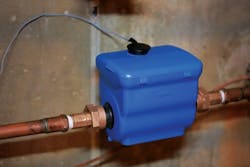Smart Water, Fewer Leaks
About the author:
Dan Pinney is vice president of water marketing for Sensus, a Xylem brand. Pinney can be reached at [email protected].
Editor's Note: The article information for this piece has been updated to reflect a change in title and contact email address on April 22, 2020.
Water utilities are under continuing pressure that stems from growing demand, water stress, fluctuating energy prices and aging water systems. Smart water technologies offer utilities the ability to improve cost and gain revenue advantages by enhancing operational efficiency. Combining metering technology, software and service through advanced communication systems, water utilities can account for every drop and turn those drops into revenue.
Assessing the Cost
Research for the “Water 20/20: Bringing Smart Water Networks Into Focus” report, compiled by Sensus, showed that utilities lose $9.6 billion each year from leaked water alone, not to mention the complications that come along with unhappy customers and the inefficient use of resources. Improved leak detection and pressure management systems can reduce leaks by 5% and pipe bursts by 10%, saving utilities up to $4.6 billion per year.
For homeowners, water leaks can cause structural damage and add stress to drought-stricken areas. In total, homeowners in the U.S. lose 1.25 trillion gal of water each year due to failure to detect or repair leaks. In a single home, leaks can account for an average of 10,000 gal wasted each year, which is enough to fill a backyard swimming pool.
Smart Water Solution
A smart water system is an integrated set of products and solutions that enable utilities to remotely monitor and diagnose problems that can wreak havoc for utilities and their customers. It also provides the capability to prioritize and manage maintenance issues, using data to optimize all aspects of the water distribution network. Key steps in setting up a smart water system include:
- Smart meters. Smart water meters can measure a range of high and low flows for enhanced reading accuracy. Enabling two-way communication, smart water meters give utilities more insight into their customers’ usage patterns. They also help detect tampering, leaks, reverse flow and other abnormalities.
- Communication network. Simultaneously, an effective communication network provides a platform to securely transmit and receive customer usage data from many end points. With this data, utilities can proactively manage and pinpoint issues throughout their water distribution network. The right communication backbone can lay the foundation for adding electric and gas metering, streetlight control or other Internet of Things (IoT) applications.
- Analytics. Analytics efficiently store and validate information collected from smart meters. Utilities should select an analytics solution that fits their business needs and integrate it into their daily operations.
- Customer portal. Utilities can empower customers with a web-based interactive application that creates an easy way to view usage charts, graphs, billing estimates, conservation tips and more. This type of portal allows customers to make more informed decisions about their own water usage.
Benefits for Utilities & Customers
With a smart water system in place, utilities can accurately measure pressure, temperature, level, flow, status and more. The system serves as a platform to resolve multiple sources of non-revenue water, including billing inaccuracies, leaks, tampering and theft.
Smart water systems enable utilities to be proactive instead of reactive, empowering them to:
- Enhance operational efficiency and free up staff to perform higher-value activities, such as analyzing data;
- Generate goodwill with customers by alerting them to problems before damage occurs or they get an exorbitant bill;
- Enhance customer satisfaction with a platform to monitor usage, so they can adjust and eliminate unwanted behaviors;
- More accurately read meters and collect and store data; and
- Reduce costs per meter read and cut down customer visits to identify problems.
With new technologies and leak detection capabilities, smart water systems deliver real business benefits and competitive differentiation for utilities. Improvements in system performance and network operations coupled with informed decision-making about the allocation of capital expenditures can stimulate dramatic savings.
As municipalities and utilities evolve, leaders continue to rethink the potential for using future investments in technology to improve the lives of residents and customers. Leveraging IoT and big data, organizations can extend existing applications and build new services aligned with smart water systems.
